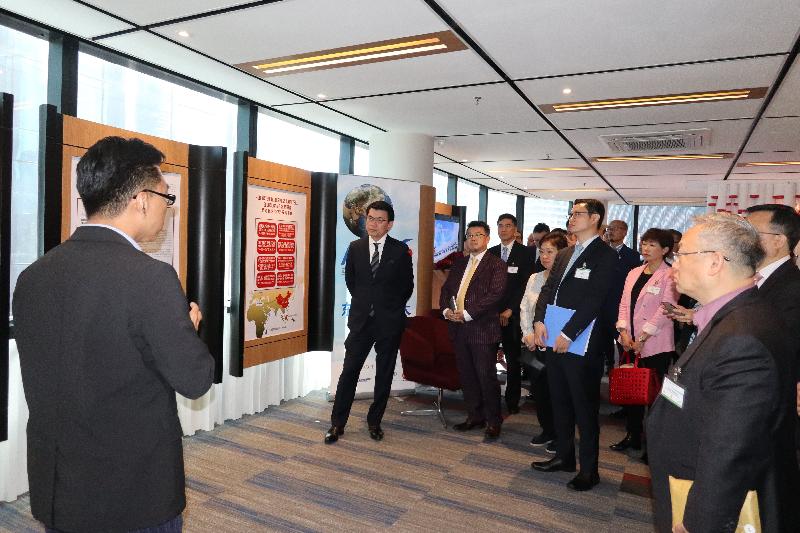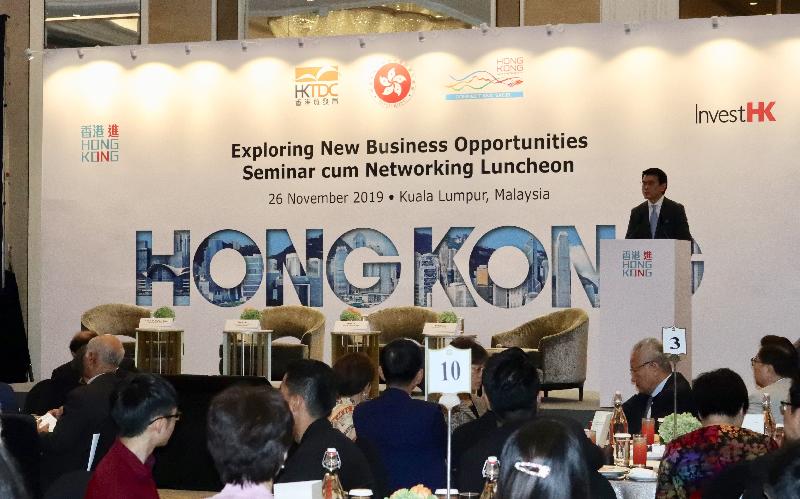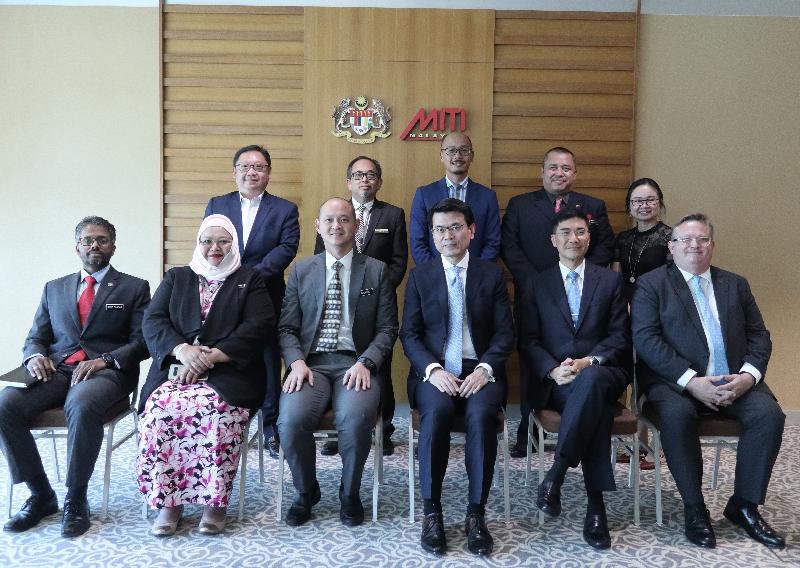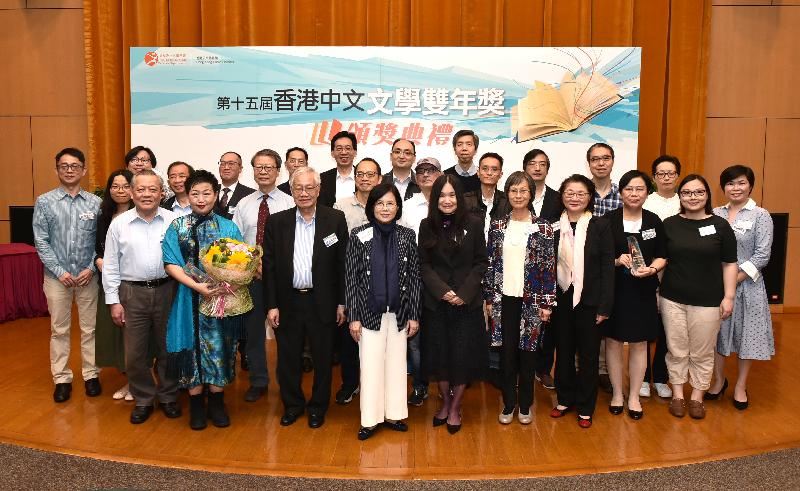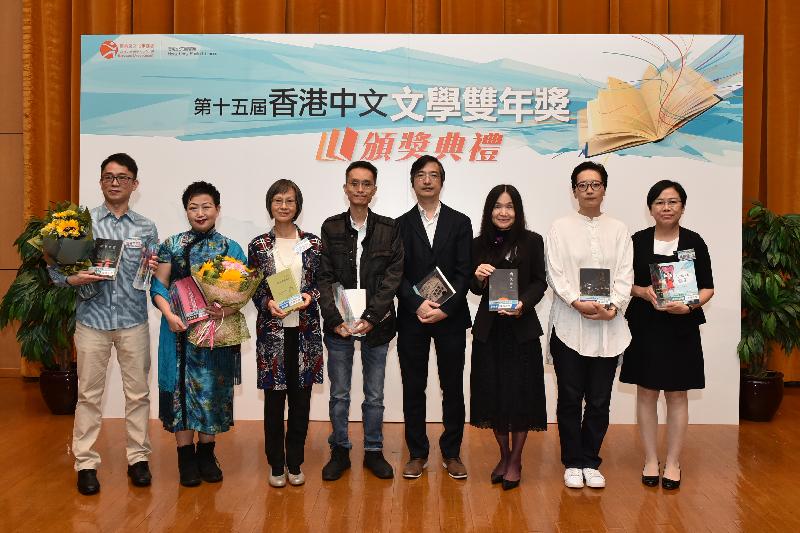SCED speaks on business mission to Malaysia (English only)
Following is the transcript of remarks made by the Secretary for Commerce and Economic Development, Mr Edward Yau, at a media session at a business seminar cum networking luncheon in Kuala Lumpur, Malaysia today (November 26):
Secretary for Commerce and Economic Development: I'm delighted to bring along a delegation of 50 business leaders from Hong Kong to KL (Kuala Lumpur). This is part of our mission riding on the Belt and Road Initiative and also promoting Hong Kong as a global financial centre. Hong Kong and Malaysia enjoy very strong, cordial and positive trade relations. ASEAN (the Association of Southeast Asian Nations) has in fact emerged as Hong Kong's second largest trading partner, and within ASEAN, Malaysia ranks number two. In fact, the common trading value surged to almost US$29 billion in the year before last, which also recorded a very substantial phenomenal growth of 56 per cent in a single year, but there is still a lot of potential that more will come between Hong Kong and Malaysia.
The delegation itself is also quite revealing on the possible collaboration between Hong Kong and Malaysia. I am bringing along a strong delegation which is composed of not just traditional investors or commerce leaders from chambers, but also a long list of professionals from architecture, engineering, accounting, legal, arbitration and environmental professions. They are all interested in the development of this country, which is emerging and also increasingly open to both goods and services. We come also at a time where Hong Kong is encountering certain difficulties. Some are global and some are local. Like Malaysia or ASEAN, Hong Kong also suffers from the setback in global trade because of the US-China trade war. In addition, we are also suffering from our own social unrest at the moment. Having said that, the fundamentals of Hong Kong still stand. Businesses go on as usual in most of the sectors. And I believe the large delegation that we are able to bring along today speaks for itself that there are a lot of interests and also confidence between Hong Kong and Malaysia. We had great meetings with the Minister of Finance (of Malaysia) and the Deputy Minister of Transport (of Malaysia) yesterday. We got a briefing on the (Malaysia-China) Kuantan Industrial Park where we saw a lot of interest. We will also be meeting the Deputy Minister from MITI (Ministry of International Trade and Industry) and we are excited to see Malaysia taking a leadership role in APEC (Asia-Pacific Economic Cooperation) next year where Hong Kong will continue to take part as a member. So far, although it's only one and a half day, the delegates have shown their interest and we have got very good reception from the Malaysian government and the business sectors, so I look forward to even closer partnership between Hong Kong and Malaysia.
Reporter: According to Bloomberg, the economy of Hong Kong in the third quarter performed worse than the whole economy expected. How can Hong Kong attract more local (Malaysian) investors to Hong Kong to do more investment since the economic performance is worse than estimated?
Secretary for Commerce and Economic Development: Thank you. As I mentioned, Hong Kong is suffering a double-hit at the moment. First, it's the external relations which hits Hong Kong and the entire world. It is the consequence of the US-China trade war. That has in fact slowed down the global trade and the global economic performance. That's why the World Bank, the IMF (International Monetary Fund) and the OECD (Organisation for Economic Co-operation and Development) are all adjusting downward their projections for this year's trade and also GDP growth globally. I think Hong Kong and ASEAN as a whole are also suffering. In general, that has knocked off some of the economic growth we enjoyed in the last couple of years. 2017 and 2018 were exceptionally good years, with 3.83 per cent growth (in GDP). We are back to almost the same level in the earlier part of this year. The second hit was of course Hong Kong's own situation, the social unrest. Therefore we suffer from technically a recession where the first quarter suffered from a -2.9 per cent (GDP growth) compared with last year.
When we look at this, the former (hit), the external relation, the impact of the US-China trade war on Hong Kong will very much depend on whether there will be an agreement between the US and China. So, with the position of the tariff, I think no one has any doubt that Malaysia or ASEAN as a whole also suffers. Looking ahead, since that has been dragging on for quite a while and there are some indications of continued talking, I believe that at least we see some light at the end of the tunnel, so to speak. As for the latter, the situation in Hong Kong, we hope that law and order could be restored, and therefore businesses would come back to normal. That would be a matter for Hong Kong, Hong Kong Government, Hong Kong community and our whole society to handle. We have seen the success in a very smooth, peaceful conduct of a major district level election, with a very phenomenal turnout. But the most important of all, it was done in a peaceful manner. So we hope that with the successful election and the restoration of law and order, that would gradually bring back the economy.
So two things together, I think the projection is we might still suffer from a bit of setback in the remaining time of this year and early next year, but let's be hopeful that with the easing of the overall, global or bilateral trade relation with a breakthrough, and hopefully with the coming back of our economy through the restoration of law and order, we hope things will bottom out, and we should see some light again at the end of the tunnel. Thank you.
Reporter: In your speech you said that in 2018, the bilateral trade between Hong Kong and Malaysia grew by 56 per cent. With this unrest, do you think there will be any impact on growth this year?
Secretary for Commerce and Economic Development: I think the trade between Hong Kong and ASEAN by and large is very robust and also keeps on growing. This is partly because of the complementary role that Hong Kong and ASEAN as a whole are playing, and also partly because of the strong growth in a country like yours, Malaysia. 2018 was an exceptionally good year but I think it's also because of the lower base that we started with. With the signing of the free trade agreement between Hong Kong and ASEAN, which Malaysia has taken full effect since the middle of this year, we are seeing further easing of market access. That means goods can be traded and services can be exchanged at lower costs. And the interests that have been shown by the delegation that come today are evidence that we have every confidence that Hong Kong people are interested in this market.
And likewise, with our common goal in seizing opportunities on the Belt and Road Initiative, we can actually go out together. On the inward side, I also see a lot of interests, not just in Hong Kong, but also in adjacent cities, the nine cities that situated around Hong Kong, what we call the Greater Bay Area. Altogether they have a population of 17 million, double the size of Malaysia, and have an aggregate GDP of US$1.5 trillion, roughly the size of the economy of Australia. So that would provide a huge market for Malaysia. We are in the middle and we have this advantage of being a two-way street, between Greater Bay Area, ASEAN and in particular Malaysia. I remain confident that the overall trend for the mutual trade will be on the rise in the immediate and long-term future.
Reporter: What are the opportunities that Malaysian businessmen can actually have with Hong Kong? Maybe offering of incentives, lower tax, lower cost?
Secretary for Commerce and Economic Development: I think Hong Kong is always a very welcoming destination for business around the world. Even before the free trade agreement, we imposed zero tariff on any import and trade. Hong Kong is an attraction to a lot of investments. They take advantage of Hong Kong as a financial centre. For instance, for projects that you are contemplating, you might need some syndicated loan and corporate finance, (this is) where Hong Kong's financial services, legal services, risk management and insurance can offer help in enhancing trade and investment deals. That's trade in services.
In addition, what Hong Kong can offer is also a window and a gateway into the fast-growing middle-income, high-spending market in the Mainland. Within the big population of the Mainland, at least 400 million of them are in the middle-income range, where they spend a lot and go out a lot. They are the main source of tourists. Very often they come through Hong Kong in both directions. A lot of services and commodities would likely take advantage of Hong Kong. This advantage is not just on paper, but it is also enshrined in the trade agreement between Hong Kong and the Mainland, what we call the Mainland and Hong Kong Closer Economic Partnership Arrangement (CEPA). This CEPA is a very special free trade agreement. It's one of the most alive and kicking FTAs (free trade agreements) because not only was it signed almost two decades ago, but we keep on updating it. Last week, we had a supplementary agreement opening up further on services sector, where Hong Kong companies can go into the Mainland. By way of Hong Kong companies, we mean those companies found in Hong Kong, and that include overseas companies operating in Hong Kong. So in a way we offer a special avenue for Malaysian companies to come through Hong Kong into the Mainland. That's rather typical. The latest count of overseas companies using Hong Kong as regional headquarters has surged to over 9 000. In fact, many of them are new start-up companies. We see a trend that within Asia, Hong Kong can be the hub for companies in this part of the region going to the Mainland. And as I mentioned, it is a two-way street. A lot of Mainland companies, including those state-owned enterprises or private companies listed in Hong Kong, would use Hong Kong to go out. The example I cited earlier this morning in my remarks is that I discovered by accident that even in the Kuantan Industrial Park, the Chinese company, as a partner to the Malaysia-China joint venture, was premised on a company they listed in Hong Kong, so that they are served by Hong Kong professional services as well.
Reporter: Likewise maybe you can also share with us is there any indication, like how do you expect the investment from Hong Kong companies to invest in Malaysia?
Secretary for Commerce and Economic Development: I believe there is a lot of optimism with your new government and support of the Belt and Road Initiative. This morning we had a briefing on the industrial park, where we saw a lot of opportunities. First, because of the changing global trade scene, protectionism and trade tension have in fact posed certain changes on the location of industries. There are a lot of searchers for alternative production places. Industrial parks like the Kuantan Industrial Park, and other areas within this part of the region, are attractive to some of the traditional manufacturers. But (what's) more important is the bigger pie that we are all building. ASEAN has grown in size and capacity. In this regard, certain better-developed economies like the Malaysian one, would naturally require a lot of professional services, which you might not so imminently need in the past. Major projects, be they railways, ports or airports, would usually require a lot of professional support from financing to risk management. Those services are easily available in Hong Kong as an international centre where international trade practices and high standards are maintained, not to mention the special knowledge and experience we have. For instance, I mentioned about the Islamic bond and the green bond that we are embarking on. Those are common visions that would be pointers where Malaysian investment or Malaysian businesses would be interested in. Thank you.
